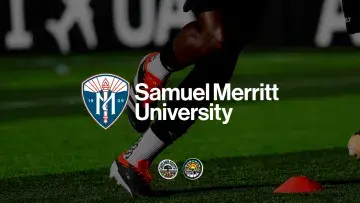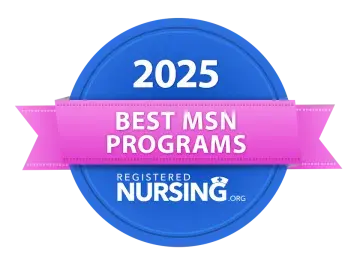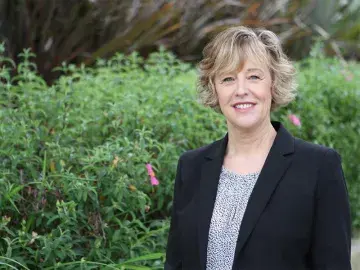SMU Nursing Students Learn Lessons in Community Health
Teaching clients how to cook veggie omelets is not what you might expect of nurses. Yet for Samuel Merritt University (SMU) nursing students working with formerly homeless residents, teaching life skills and good nutrition is part of their goal to promote good health.
On a Tuesday morning in early December, SMU students were busy whisking eggs and cutting up tomatoes, mushrooms and spinach in the kitchen at the Bishop Swing Community House in San Francisco. In groups of three, the residents came in to choose their ingredients and learn how to cook the healthy omelets. Once finished, they carried their plates into the adjacent community room to enjoy their breakfasts.
The supportive-housing development in the South of Market neighborhood is home to 134 formerly homeless men and women, many of whom have struggled with mental illness and substance abuse. It was named for Bishop William E. Swing, who initiated the response of Episcopal Community Services (ECS) to homelessness in San Francisco more than 35 years ago.
Each academic semester, as many as 40 SMU nursing students work with clients at 12 different ECS housing sites in San Francisco, which provide permanent supportive housing to the city’s poorest residents. Through health screenings and educational workshops, the students focus on issues including nutrition, hypertension, diabetes, stress management, and heart disease.
Tran Phan, a student in the Entry Level Master of Science in Nursing (ELMNS) Family Nurse Practitioner program, said the cooking activity was as much about community building as teaching healthy eating habits to people who were still adjusting from chronic homelessness to living in studio apartments.
“It helps to deal with the loneliness,” said one of the Bishop Swing residents, as he waited to have his blood pressure checked after breakfast. He said the students had taught him a lot of nutritional tips such as that bell peppers provide as much vitamin C as oranges, but with less sugar.
“This group has been amazing,” said the resident, who has hypertension and was carrying a library book titled “Nutrition’s Cures” under his arm. “They’ve helped me change my eating habits.”
Three students spent one day a week at Bishop Swing over three months this fall as the clinical placement for their community health course. They worked with the residents to restore a vegetable garden, conducted art therapy, and led yoga classes.
The students did their previous clinical placements in hospitals, and none of them had ever worked with people who have a history of homelessness. They said they learned how to help the residents by asking about their needs and building relationships with them.
“Rather than coming in and thinking we have all of the solutions and they have all the problems, instead we strengthened what they have here and built on the knowledge they already have,” said Phan.
She said working with the residents has changed her perceptions of what it means to be homeless.
“The people here just got dealt a bad card,” said Phan. “They’re seeking community and safety and can’t do that when they’re living on the streets.
ECS serves more than 7,000 homeless and extremely low-income, men, women and children each year by providing housing, shelters, services for seniors and people with disabilities, adult education and vocational training.
SMU has partnered with ECS since 2005. SMU Assistant Professor Miriam Eisenhardt (MPH, RN) said the clinical experience is transformative for the nursing students, whose work is also an integral part of ECS programs and continues to grow every year.
“Students begin the semester not knowing what to expect and outside of their comfort zone,” said Eisenhardt. “And the students grow tremendously — they learn to relate to their clients, listen to their stories, and understand their clients’ community, ultimately discovering how much they and their professional role matter to one of the most marginalized and vulnerable communities in our society.”
Eisenhardt said people who have been homeless and suffered significant trauma often have a difficult relationship with the healthcare system, so it is a goal of the SMU students’ work with the ECS clients that they develop a more trusting relationship with healthcare providers.
Interacting so closely with the housing clients also enables the students to better understand how living conditions and social policies impact a person’s well-being, also known as the social determinants of health.
Danae Murray, who is studying to become a nurse case manager, said the experience has taught her to ask her hospital patients about their support systems and access to care before they are discharged.
“It has changed my practice because I look at people differently now,” said Murray.
Each semester, students at each housing site structure their health education based on the residents’ concerns. Students at the nearby Canon Barcus Community House, which caters to families, focused on women’s safety after one of the resident’s daughters was accosted on the street. The students compiled a list of safety tips, demonstrated self-defense techniques and distributed whistles. And at The Alder, a residential hotel on busy Sixth Street, the major topic was the role of stress in mental health.
SMU students working at the Canon Kip Community House designed a health journal for residents to record their daily blood pressure readings and glucose levels that they can bring it to medical appointments to ensure continuity of care.
During one lunchtime gathering, the students guided several residents through a mindful breathing exercise before starting a conversation about diabetes while sharing lasagna and salad.
Student Molly Jessup, who is studying to be a family nurse practitioner, said listening to the residents has been even more powerful than providing health education.
“Sitting, looking them in the eye, and relating to them has been the most impactful thing to me,” said Jessup.
One resident spoke in detail about the dangers of uncontrolled diabetes, calling it a disease that “can creep up on you like a snake” if you don’t take action like changing your diet. Within a short time, he was talking about his childhood and tears came to his eyes while recalling his mother’s death when he was a young boy.
“Moments like this when residents open up to us and share their personal stories are lessons we wouldn’t be able to learn if we weren’t here,” said Vivian Yu, an ELMNS case management student. “We expect to teach them and they’re the ones teaching us.”


